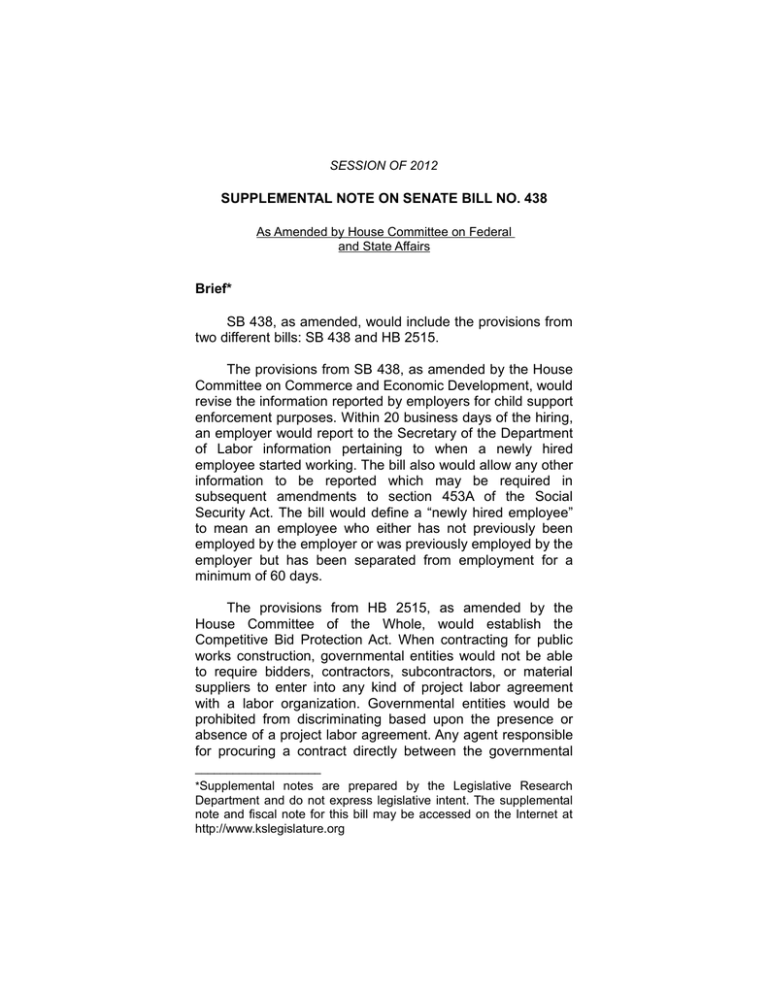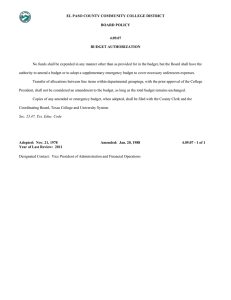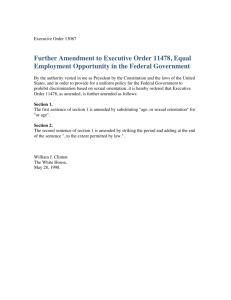SUPPLEMENTAL NOTE ON SENATE BILL NO. 438 Brief* SB 438
advertisement

SESSION OF 2012 SUPPLEMENTAL NOTE ON SENATE BILL NO. 438 As Amended by House Committee on Federal and State Affairs Brief* SB 438, as amended, would include the provisions from two different bills: SB 438 and HB 2515. The provisions from SB 438, as amended by the House Committee on Commerce and Economic Development, would revise the information reported by employers for child support enforcement purposes. Within 20 business days of the hiring, an employer would report to the Secretary of the Department of Labor information pertaining to when a newly hired employee started working. The bill also would allow any other information to be reported which may be required in subsequent amendments to section 453A of the Social Security Act. The bill would define a “newly hired employee” to mean an employee who either has not previously been employed by the employer or was previously employed by the employer but has been separated from employment for a minimum of 60 days. The provisions from HB 2515, as amended by the House Committee of the Whole, would establish the Competitive Bid Protection Act. When contracting for public works construction, governmental entities would not be able to require bidders, contractors, subcontractors, or material suppliers to enter into any kind of project labor agreement with a labor organization. Governmental entities would be prohibited from discriminating based upon the presence or absence of a project labor agreement. Any agent responsible for procuring a contract directly between the governmental ____________________ *Supplemental notes are prepared by the Legislative Research Department and do not express legislative intent. The supplemental note and fiscal note for this bill may be accessed on the Internet at http://www.kslegislature.org entity and contractor also would be prohibited. The bill would not prohibit bidders, construction managers, contractors, design-builders, subcontractors, or material suppliers from voluntarily entering into a project labor agreement. Contractors, design-builders, or construction managers could require subcontractors or material suppliers to enter into a collection bargaining agreement. Background After consideration and debate in the House Committee of the Whole, SB 438, as amended, was re-referred to the House Committee on Federal and State Affairs. HB 2515 previously was passed by the House. The Committee amended provisions from HB 2515 into SB 438, retaining all provisions in the base bills as originally amended in the House committees. SB 438 Background. The Division of Child Support Enforcement within SRS is required by federal law to maintain a directory of new hires for the collection of child support. The Division contracts with the Labor Department to manage the database. Under current law, employers are required to provide information to the Labor Department about an employee’s name, address, Social Security number, and wages. This information is accessible to the Department of Social and Rehabilitation Services (SRS) to determine whether child support payments are to be withheld from an employee’s wages. The bill was introduced at the request of the Division. The Division and the Department of Labor testified in favor of the bill. Recent changes in federal law are to be reflected in state law. The Division stated that failure to implement the changes could jeopardize approximately $37 million in federal funds for the Division’s operations. The Labor Department already collects the information required by the bill. The 2- 438 Department suggested two amendments that the Senate Committee later adopted. There was no opponent testimony. The Senate Committee on Commerce amended the bill in two places to: ● Clarify the term “newly hired employee”; and ● Authorize by federal reference any additional information which employers may be required to report in the future. The House Committee on Commerce and Economic Development amended the bill to specify that employers would be required to submit information about newly hired employees within 20 business days of the start of employment, rather than 20 calendar days. According to the fiscal note prepared by the Division of the Budget, the bill, as introduced, would cost approximately $1,197 in programming costs for the Department of Labor. Additional costs incurred by SRS would be negligible. HB 2515 Background. Governmental entities that would be subject to provisions in this bill would include municipalities and state agencies as defined by KSA 12-105a and KSA 75-3728a, respectively. The provisions of the bill would not supersede other provisions of state law or the National Labor Relations Act (29 U.S.C. § 151 to 169, inclusive) which may allow or protect project labor agreements. Proponents of the bill included various associations of building and constructions contractors, the National Federation of Independent Business, and the Kansas Chamber. Proponents indicated the bill would ensure that contracts are awarded on a fair and competitive basis. Proponents contend project labor agreements increase 3- 438 construction costs, circumvent the state’s right-to-work policy, and discriminate against women and minority-owned businesses. Opponents included various labor organizations, builder and contractor associations, the Kansas Chapter of the American Institute of Architects (AIA Kansas), the Board of Regents, and the Division of Design Management at the University of Kansas. Opponents questioned the need for the legislation since most, if not all, examples cited by proponents were in other states. Opponents also questioned the bill’s application. Contractors and construction managers could be disqualified from bidding on public works projects because they are signatory to collective bargaining agreements that contain subcontract restrictions. AIA Kansas, the Board of Regents, and the Design Management Division opposed section 4 of the bill, as introduced, which would have required all contracts valued at $100,000 or more to be bid through the Department of Administration. These opponents contended the bill was inconsistent with the State Educational Institutions Project Delivery Construction Procurement Act which streamlined the process to bid non-state funded projects. The House Committee on Commerce and Economic Development amended the bill to: ● Include agents for governmental entities in the prohibition on requiring project labor agreements and discrimination; ● Include construction manager and design builder in the list of private entities that may voluntarily enter into a project labor agreement; ● Delete section 4 of the bill, as introduced, which would have required all contracts valued at $100,000 or greater to be bid through the Department of Administration; and 4- 438 ● Make uniform use of the term “governmental entity” throughout the bill. The House Committee of the Whole amended the bill to: ● Revise the bill's purpose to include "governmental entities"; and ● Clarify that the prohibition found in section 3 applies to a governmental entity's agents who are responsible for procuring a contract. According to the fiscal note prepared by the Division of the Budget, the introduced bill could increase the volume of projects subject for review and approval by the agency. Costs associated for this process would be passed on to the state agency in the form of a fee. However, the Department is unable to provide a precise estimate of the amount of additional fees associated with the bill. The Kansas Department of Transportation indicates any fiscal effect resulting from the passage of the original bill would be negligible. The Board of Regents indicates the original bill would negate between 1.0 percent and 3.0 percent savings in construction inflation. The Kansas Association of Counties and the League of Kansas Municipalities estimate that any fiscal effect resulting from the bill would be negligible to local governments. 5- 438


